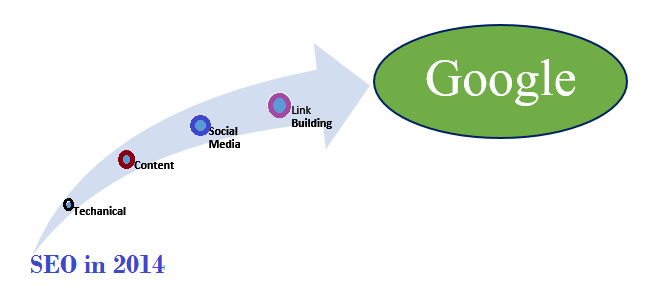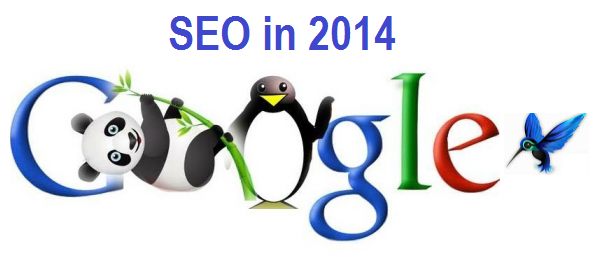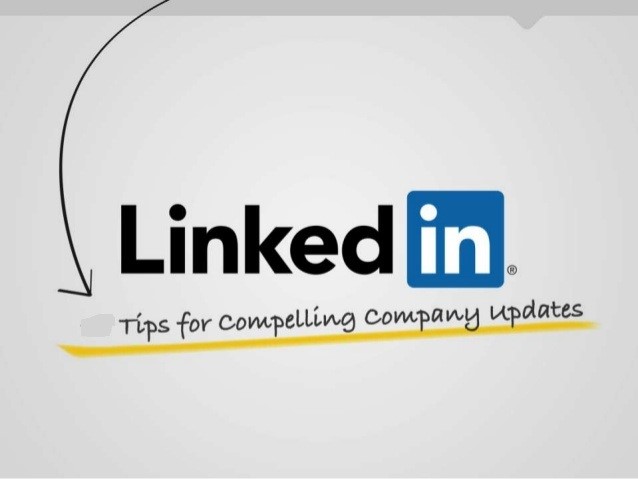As old makes way for the new…similarly, 2013 paved the way for 2014. The year 2013 was filled with a lot of revolutionary changes in the world of SEO. As a result of these changes, companies and individuals are brain storming in order to come up with an effective SEO strategy for 2014.
However, while drafting a strategy, one should not assume that Google is still using a traditional approach to provide search results. Google’s Knowledge Graph enabled the search engine to understand the meaning of web content whereas the Hummingbird update enabled it to understand the context behind search queries. Now one has to be attentive, since after these updates, Google has moved away from the traditional method of ranking search results from most relevant to least and continues to work hard so that the search results provided by it are more accurate and fast.
Google, along with various other search engines, is now considering content freshness (Frequent Update), localization and personalization as important ranking factors apart from content relevancy of the search results. This major change persuaded digital agencies to think twice before preparing a SEO strategy for their clients.
So, what should be the right strategy in 2014 as compared to 2013?
To answer this question, we have taken a few significant ranking factors into account in our analysis to keep the website in top search engine results as compared to their competitors.

We have tried to cover all the major areas which can play an important role in order to achieve higher organic presence in year 2014.
Technical Elements Should be Strong:
– In order for a strong technical element, the following queries should be asked while undertaking a technical analysis of domains:
– Is the page load time of the web pages less than 3 seconds? Google has provided a tool to monitor the website page speed score in order to provide better accessibility.
– Is usability of domains intimating visitors? Poor usability irritates visitors.
– Does the visibility of a website appeal to visitors or is it strong enough to keep visitors engaged?
– Is the website compatible with mobile devices? The world is moving towards smart mobile devices. It is vital to either have a responsive website or have a dedicated mobile website which can render well on mobile devices.
– It is important to check if all the Meta tags (i.e. canonical, robots, title and description) are placed effectively over the website.
– Is the broken link count zero?
– Do you have a proper custom error page?
– Do you have structured data Markup in order to inform search engines about the page content? Example: If your website is related to the e-commerce or Food/Recipes industry, you can tag your content in order to receive a higher search engine position. Google helps webmasters to tag their content effectively by providing the following testing tool – http://www.google.com/webmasters/tools/richsnippets
– Do you have updated sitemaps (XML, HTML, urllist.txt) to inform search engines about your website pages?
To become Google’s first choice of search result against user searched queries, you will have to implement the solution to these queries before indulging in promotion of your website.
Panda Only Love Quality Content:
Content was the king, is the king and will be the king. It always will play a significant role in search engine ranking. After major panda updates, content of the website is playing a significant role in keyword ranking. Panda is not going to reward a website that has duplicate, poorly formatted and non-informative content.
A few points that should be considered before planning content are as follows:
– Content should be unique, informative and engaging. Google latest algorithm Hummingbird suggests marketers to think more about the meaning of words on the page and to create content around topics rather than targeted keywords.
– Before planning a page; understand that your priority is the user and not the search engine.
– Placement of effective keywords inside the content will always remain a winning strategy. Consider keywords proximity (i.e. primary keyword should be in starting) factor because Google still looks for the first line of content if it is unable to find description tags.
– Do not stuff keywords forcefully
– Content of website should be self-explanatory and appealing.
– Content should be interrelated with other page content.
– Use call to action in your content to appeal to visitors.
How Strong is your Businesses Presence on Social Media Channels?
In this day and age, SEO cannot operate independently without the support of social media channels. Both have become reciprocal to each other. Google now considers social signals in its organic ranking result and traditional techniques have now become outdated. Google has started to consider signals from Google Plus, Facebook, Twitter, Pinterest and many other social media platforms in its organic results. Presence of the company’s profile on various social media platforms and regular feeding of fresh content on them gives a clear signal to search engines about the likelihood of the website.
So, if your business does not have an active presence on industry specific or business relevant social media platforms, you are missing its advantages. To strengthen your social image and impress Google, you have to be active on all the required social media platforms.
Does Penguin Like your Links?
Penguin updates, April 2012 stopped the race of link building competition and many websites got penalized for its poor quality link building practices. Google still considers the number of quality links that a website has, while providing search engine ranking to it. Now, Google will not consider poor quality links. If you have quality links following then, you will be on top search results otherwise Google will not honour your dream of achieving a top ranking.
What should be avoided while practicing link building?
– Avoid making keyword centric links.
– One must have a right balance of links following.
– Avoid linking with low quality websites which have a low page content, poor designs and are not indexed by Google.
– Keyword centric Blog commenting.
– Low authority website links. Not popular among the industry users.
– Bulk links for particular keywords.
– Avoid low quality article syndication websites.
– Avoid low quality bookmarking.
– Do not bookmark pages which have less content or no informative content.
– Avoid low quality guest post websites.
– Avoid low quality content while content marketing
Expert web marketers will benefit from keeping a close eye on their website link profiles and doing weekly or monthly audits to identify and remove inbound links which are built unnaturally. High quality content which generates high quality links will still remain critical.
Now it is time to wait for the next Google update and make a new strategy according to those changes. Till then, keep your eyes open and go through the SEO road map provided in this blog in order to attain top ranking.





Tell us your thoughts in the comments